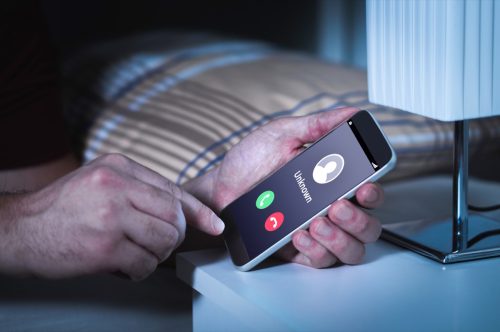If You Get This Call From a Federal Official, Contact Police Immediately

The convenience of caller ID is that you know who’s trying to reach you before you pick up. If you have the number in your contact list, your phone will let you know who’s calling—technology has even gotten so advanced that your smartphone can let you know if it’s “potential spam” so you can avoid the call. However, if your caller ID tells you that you’re getting a call from a federal official, chances are you’re going to pick it up. But police are now warning about one such call you could receive, and why you’ll want to report it immediately. Read on to find out why you won’t want to speak to this one official in particular.
READ THIS NEXT: If You Get a Call About This, Hang Up Immediately, Police Warn.
You take a gamble when answering the phone these days.

Spam calls are nothing new, but it seems as if they are getting more and more common. Police departments across the country have issued warnings about these calls, where a scammer will often “spoof” caller ID information to make it look like a phone number from the police or other authoritative agencies.
A sophisticated new scam has been fooling residents in Virginia, where fraudsters call victims, claim to be police officers, and threaten to arrest them for failing to appear for jury duty. The scammers, of course, say that you can avoid this by paying a fine via electronic payment or by purchasing a prepaid debit or gift card, the Albermarle County Sheriff’s Office said, per CBS19 News.
In another instance, scammers call—or show up on your doorstep—and claim that they are from your utility company. And according to the Chatham Borough Police Department in New Jersey, the scammer will again tell you that you need to make a payment on the spot in order to avoid your power being shut off.
These cons are exploitative and designed to make you feel like you need to act immediately. Instilling a sense of urgency is what these criminals do best, which is why you’ll want to think before speaking to a federal official, as they might not be who they say they are.
Police in Michigan said an elderly victim was targeted.

The Michigan State Police (MSP) issued a warning after one resident received a particularly alarming phone call. According to a June 28 news release from the MSP, a caller posing as a “Federal Officer with the Office of the Inspector General” contacted an elderly resident in Ostego County.
As part of an elaborate scam attempt, the caller told the victim that a car had been rented in their name and used in a drug trafficking operation in Texas. The scammer then told the victim that they would need to issue a new social security number. The victim provided their current social security number when asked, but red flags went up when the scammer asked what banks they had accounts with.
RELATED: For more up-to-date information, sign up for our daily newsletter.
Scammers are going the extra mile.

While the victim, in this case, didn’t give away their banking information, the scammer took an extra step to try and make their fake identity look legit. Per the MSP news release, the scammer sent a picture of his “credentials” to the victim, including a badge and a photo ID.
As scammers can be forceful and get angry if you don’t comply, it can be tempting to give in to what they want. But to keep yourself protected, police remind you not to share your personal information and to inform authorities about any attempted scams.
“Never divulge personal information to anyone over the phone, online, or by mail,” The MSP said in the news release. “If you suspect you are being scammed or doubt the authenticity of the person contacting you, notify law enforcement immediately.”
The FBI has previously weighed in on this issue.

The latest incident occurred in Michigan, but scams like these are widespread, according to the Federal Bureau of Investigation (FBI). In April 2021, the FBI issued a press release warning the public in New England about criminals posing as representatives from government agencies. Some scammers are even bold enough to say they represent the FBI.
In these instances, the caller will tell the victim and say charges have been or will be filed against them, making threats to confiscate property or freeze bank accounts unless payment is made on the spot. You might not think you would fall for something like this, but unfortunately, you could. Across the U.S., these scams led to a loss of $109,938,030 in 2020, according to the Internet Crime Complaint Center, the FBI said.
“Nobody wants to be the subject of a law enforcement investigation, and scammers are using that to their advantage to try and intimidate people into just handing over their hard-earned money. We’re asking you not to fall for it,” Joseph R. Bonavolonta, special agent in charge of the FBI Boston Division said in the 2021 press release. “It’s important to resist the urge to act immediately and verify who is actually contacting you.”
The agency reminded the public that agents won’t call and threaten to arrest you or demand payment, and they won’t reach out about alleged “frozen” Social Security numbers. You could also fall victim to these scams via email, so keep an eye out for misspelled works or other giveaways, even when an email may look legitimate.